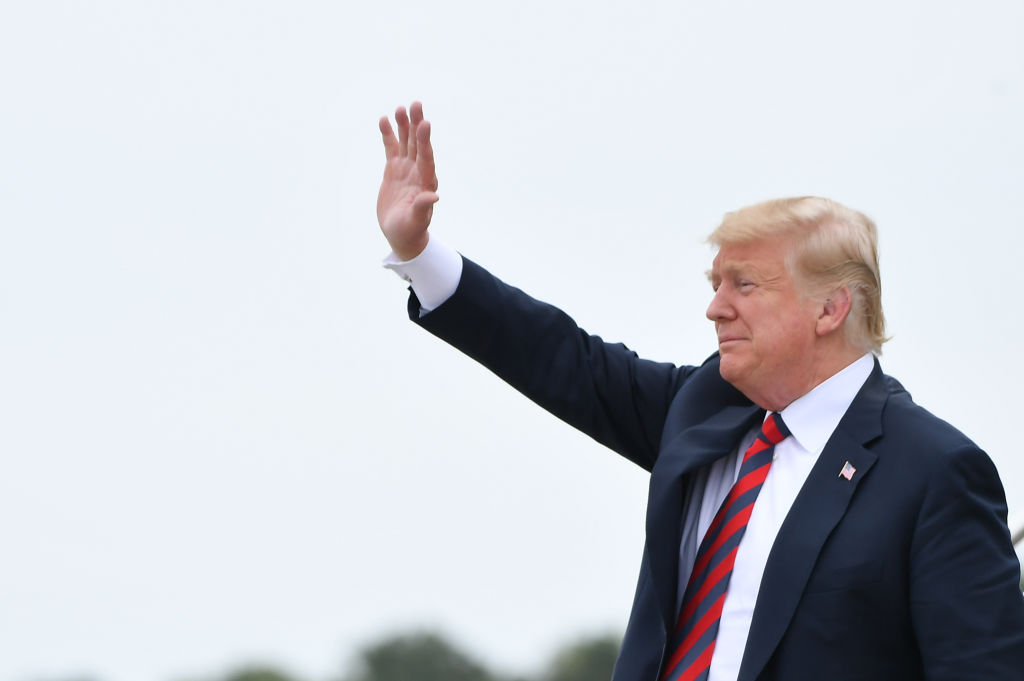If the Democrats want to surf a real blue wave in the midterm elections they will have to stop conceding the economy to President Trump. Look at a current snapshot and consider: job numbers are great, minority unemployment is at record lows, the stock market is happy. But beneath this cheery – temporary – façade, the same problems that caused the 2008 financial crash are still lurking. In fact, the contributing factors of the last recession have, in many respects, worsened. Ultra-high-risk financial behaviour, increasing deregulation and rosy political rhetoric telling us all to forget about the problems of the past: these are a few hallmarks of the current situation that also echo loudly with the lead-up to the 2008 collapse.
Whether the next recession comes from the student debt crisis, housing bubble, financial deregulation gone amuck or general global insecurity, it’s on its way. The next crash is a question of when, not if. The fundamental corruption and recklessness which led to the last implosion hasn’t been touched. Conflicts of interest with bond rating agencies, the insecurity of money market funds, various issues with government-sponsored mortgage-backers, steady weakening of Dodd-Frank limitations which were already weak to begin with and many other factors spell deep trouble ahead.
Politically, the point might be raised that voters tend to have short memories.
If things seem to be getting a bit better now why should the average swing voter care about doom and gloom predictions? As Anjan Thakor writes, financial markets and economic forecasting trends to overconfidence and ‘if things are going well, it’s easy to convince yourself that they’ll continue that way indefinitely.’
However, the real foot in the door right now for populist Democrats is to point out that even evident and real economic improvement since President Trump has predominantly been in unstable, low-wage jobs. His tax cuts have done much less to help the middle class than rhetoric would suggest, in fact they have helped the ultra-rich most of all. Those looking to tap into populist energy might also point out that Trump’s policies have benefited large corporations, including major outsourcers. In fact the Trump Administration has been far from shy about even giving government contracts to outsourcers, and jobs are being sent overseas at a faster pace than under Obama. In terms of tax policy, the GOP even admits internally that they’ve lost the argument on tax cuts.
During his run for the presidency, Trump correctly pointed out that the economy is experiencing a giant bubble, and stated confidently that eventually that bubble will pop. As Trump said in a September, 2016 debate where he and Hillary Clinton did their best impression of caring about the middle class: ‘the only thing that looks good right now is the stock market, but if you raise interest rates even a little bit that’s going to come crashing down.’ Trump went on to point out that ‘we are in a big, fat, ugly bubble.’ Now he has conveniently forgotten his own words and is using the economy as his number one guarantor of re-election, telling Fox News that the stock market and economy will crash if he is impeached. The irony is that Trump may not be wrong. But it’s still a giant bubble, and that would only prove the point.
A big, fat, ugly bubble after President Obama is a beautiful, robust economy under Trump. Didn’t anybody notice the bait and switch? Hardly, or at least they didn’t tell the truth about it. In fact, Obama has recently been talking about how today’s economic growth is because of him. That is when he’s not busy wooing Republican billionaires over to vote for the blue team. (Because everyone knows that more plutocrat money in politics is what voters really want across the political spectrum). But it’s time to get back to basics. Could it be that a bubble is a bubble is a bubble? Of course corporate Democrats don’t want to admit it’s a bubble, and Trump has ample reason not to do so as well, particularly with the current political brinksmanship hemming Washington in on all sides. It’s the perfect storm. Grey clouds of debt and precarious, unsustainable growth are roiling on the horizon and this time instead of Lehman Brothers and a lot of foreclosures it’s more likely to degrade the last healthy remnants of America’s industrial strength and small business sector.
The 2016 Republican platform rhetoric about standing up for Main Street and potentially restoring the Glass-Steagall Act that puts strict separations between commercial and investment banking turned out to be risible hot air. In fact, voters who shouted at Ted Cruz ‘where’s your Goldman Sachs jacket at?’ might have been slightly chagrined to find Trump’s initial cabinet dominated by the highest-ranking members of Goldman Sachs such as Gary Cohn. Is anybody paying attention? Instead Democrats keep going on with advanced collusion theories and impassioned sermons against mean tweets.
Socialised losses and privatised gains continue, whether it’s exploitative practices by Amazon or large fast-food corporations and minimum wage multinationals leeching off the social safety net to the tune of billions of dollars from taxpayers to support their low-wage house of cards. It’s not just about what’s ‘fair’ or patriotic, it’s about what’s sustainable, and today’s economic reality is far from sustainable, nor is it as good as most Democrats and Republicans seem to believe – or want to believe.
Rare voices like Tucker Carlson slamming Jeff Bezos for funneling money away from hardworking taxpayers and exploiting workers are dismissed as political wrangling, motivated by Bezos’ Washington Post’s generally anti-Trump line. However, Carlson’s anti-oligarchy sentiments are, in fact,the populist momentum of the future on both the left and right, whether they’re cast as supporting the free market or lessening income inequality and bolstering social programs, both ‘sides’ appear to be converging in terms of various critiques of crony capitalism.
So how does it all impact the current optimistic economic outlook and the upcoming midterms? Many people still hold popular but inaccurate views regarding the cause of the 2007-2009 financial crisis: the belief that greedy banks and irresponsible government regulators share a large amount of blame is correct. Anger that top companies and individuals got away with little or no punishment as the government bought out their garbage assets in the TARP bailout still simmers today. Many people were led down fraudulent paths of mortgage debt to keep inflating the dangerous balloon, as David Dayen notes in his book Chain Of Title, which follows three people who came up against the Wall Street mortgage mafia. After 2008 it was ordinary people who lost the most. In many ways the recession was basically a giant wealth transfer from the poor and working class to the ultra-rich, not to mention the huge pile of profits vacuumed up by institutional investors that left retail investors behind.
Voters understand that nothing has been done to fix the ‘original sins’ that caused the crash: banks are still cashing in on shady, risk-riddled financial instruments. The banks that were too big to fail in 2008 are even bigger now.
It’s not necessarily just a matter of bad financial behaviour, either: analysts like Cathy O’Neil have argued the US financial system itself can’t be fixed and the paradigm itself is faulty.
The quick answer of the Left for more regulation is also less straightforward than it sounds, given that there are numerous ways for institutions and banks to sidestep regulation that can make it backfire in unexpected ways. One starting point would be to raise capital requirements for banks so they don’t get hit as hard with burgeoning debt when things start to decline. Another option is to raise the leverage ratio (capital to debt ratio for lenders). The US has done so slightly but it’s still very low. However these measures are not seen as a plus by most banks and thus are unlikely to be adopted.
It’s not always possible to cut out the risks and detours that big institutions take, but increasing how much capital they need to lend would make them put their money where their mouth is. However, politicians want banks to put their money in re-election campaigns. The Republicans want to ride a strong economy to victory, while the Democrats seem to have essentially conceded the economy and its apparent strength as a win for the GOP.
If the Democratic party were smart, or genuine (yes, I know, but doctors advise that laughing every day is good for your health), they would be going after the lies underlying today’s boom. Even if more people are feeling optimistic today, there’s a giant contingent of populists and independents who are struggling economically and can see the storm clouds gathering. If Democrats weren’t getting checks from the same plutocratic donors as Republicans they would admit that for many, many people things are not so much better economically than they were five years ago, especially for young people who entered the job market around 2008.
Ten years on, we now have various statistics that show the scope of the 2008 recession’s economic and social impact: dramatically declining birthrates, low rates of home ownership, low savings, falling median wages, massive student debt and a significant loss of trust in institutions and government, especially among younger generations.
These trends have major consequences, and the next crash is only going to exacerbate them. But neither the Democrats nor the Republicans are looking that far ahead.


















